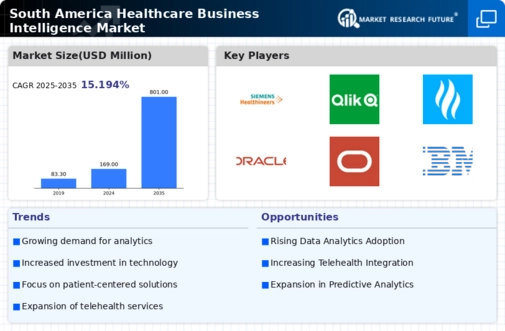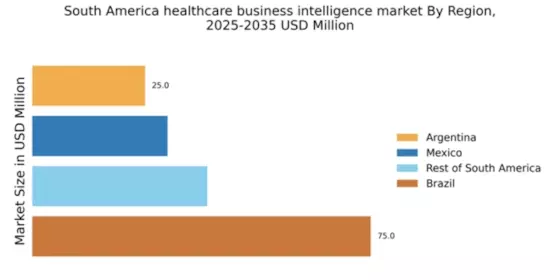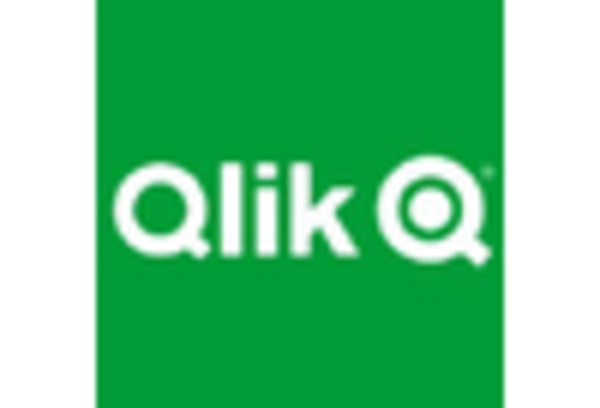Government Initiatives and Funding
Government initiatives play a crucial role in shaping the healthcare business-intelligence market in South America. Various national and regional programs aim to enhance healthcare infrastructure and promote the adoption of technology-driven solutions. For instance, investments in health information systems and data analytics are increasingly prioritized, with funding allocations reaching upwards of $500 million in recent years. These initiatives not only facilitate the implementation of business-intelligence tools but also encourage collaboration between public and private sectors. As governments recognize the importance of data in improving healthcare delivery, the healthcare business-intelligence market is likely to benefit from sustained financial support and policy frameworks that foster innovation and technology adoption.
Growing Focus on Patient-Centric Care
The shift towards patient-centric care significantly influences the healthcare business-intelligence market in South America. Healthcare providers are increasingly adopting business-intelligence solutions to better understand patient needs and preferences. This trend is reflected in the rising utilization of data analytics to personalize treatment plans and enhance patient engagement. Approximately 70% of healthcare organizations in the region report that they are investing in technologies that support patient-centered approaches. By harnessing data insights, providers can improve patient satisfaction and outcomes, thereby driving the demand for business-intelligence tools. As the emphasis on patient-centric care continues to grow, the healthcare business-intelligence market is expected to expand in response to these evolving needs.
Increased Emphasis on Regulatory Compliance
The healthcare business-intelligence market in South America is significantly impacted by the increased emphasis on regulatory compliance. As healthcare regulations become more stringent, organizations are compelled to adopt business-intelligence solutions that ensure adherence to legal and ethical standards. Compliance with data protection laws, such as the General Data Protection Regulation (GDPR), necessitates robust data management practices. Consequently, healthcare providers are investing in business-intelligence tools that facilitate compliance monitoring and reporting. This trend is expected to drive market growth, as organizations recognize the importance of maintaining regulatory standards while optimizing their operations. The healthcare business-intelligence market is thus likely to expand as compliance becomes a critical focus for stakeholders.
Technological Advancements in Data Analytics
Technological advancements in data analytics are reshaping the healthcare business-intelligence market in South America. Innovations such as artificial intelligence (AI) and machine learning (ML) are increasingly integrated into business-intelligence solutions, enabling healthcare organizations to derive actionable insights from complex datasets. The market for AI-driven analytics is projected to grow by over 20% annually, reflecting the increasing reliance on sophisticated technologies to enhance decision-making processes. These advancements facilitate predictive modeling, risk assessment, and trend analysis, which are essential for improving healthcare delivery. As organizations seek to leverage cutting-edge technologies, the healthcare business-intelligence market is likely to witness substantial growth driven by these technological innovations.
Rising Demand for Data-Driven Decision Making
The healthcare business-intelligence market in South America experiences a notable surge in demand for data-driven decision making. Healthcare providers increasingly recognize the value of leveraging data analytics to enhance operational efficiency and patient outcomes. This trend is evidenced by a projected growth rate of approximately 15% annually in the adoption of business-intelligence solutions across the region. As healthcare organizations strive to optimize resource allocation and improve clinical workflows, the integration of advanced analytics tools becomes essential. The ability to analyze vast amounts of data enables stakeholders to make informed decisions, ultimately leading to better patient care and reduced costs. Consequently, the healthcare business-intelligence market in South America is poised for significant expansion as organizations prioritize data-centric strategies.


















